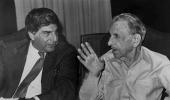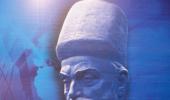To me, he always symbolised the sincere, confident, face of a Bharat whose rise is unstoppable.
Ratan Tata was a Rishi who was unquestioningly trusted by people who never saw him and never met him, asserts Tarun Vijay, the former BJP MP.

The net worth of the Tatas can never be calculated in the billions they have, but is expressed in a simple word -- Trust.
Yes, the trust that was symbolised in the persona of Ratan Tata is what they have earned. More than trillions of others and more than the heaviest state awards anyone has ever earned.
When I was a child, my mother would say, "Jakar lala se Tata ka namak le aana."
Tata was the salt of India. No other brand was accepted in our home and in millions of other homes.
There are countless things that the Tatas produce and there are countless people who trust those brands blindly.
When everyone would look the other way in everything, the only house to salvage the situation remained and remains the house of Tatas. Air India's rescue is a small example.
When the new Parliament was to be built almost immediately who was trusted for the job? I would rather say Ratan Tata.
After 400 years of the continuous struggle when Hindus got to rebuild the Ram temple at Ayodhya, the one name that came on the lips of everyone to be entrusted the job to guide and advice was Ratan's Tata Consulting Engineers.
In his sunset years, Ratan Tata looked frail and weak, but he was as strong as steel from within.
There was nothing, absolutely nothing, that he would gain by visiting the RSS headquarters in Nagpur.
But since he had a faith in the ideals and the dedication of the RSS swayamsevaks, he decided to make a pilgrimage to the Dr Hedgewar Smruti Mandir and with full devotion and sincerity.
Criticism and allegations made him stronger. He faced family earthquakes, he was dragged into murky political games, but he kept his cool and responded gracefully.
He was grace personified.
Abaji Thatte was the personal physician and the most trusted lieutenant of Madhav Sadashiv Golwalkar, the RSS' second sarsanghchalak.
A super speciality cancer hospital was to be built near Nagpur in his memory. Nitin Gadkari had taken the lead with several RSS swayamsewaks to realise this dream.
Ratan Tata came forward to help unhesitatingly. That was his character -- never say no to any good cause.
When Cyrus Mistry, whom he shaped into what he became and whom he trusted like none else, revolted and criticised him publicly saying Ratan Tata's decisions were 'emotional', Ratan Tata replied that the Tata Group is built on emotion and passion, not just short-term profits.
What a great reply that was.
He maintained the sanctity of all institutions that his great grandfather Jamshetji Tata built.
From the most trusted academic rigour that all saw in the Tata Institute of Social Sciences to the last resort of hope for hopeless cancer patients that is the Tata Memorial Hospital, Ratan Tata nourished them without ever changing their contour and colour.

Do you know an extraordinary giant known as F C Kohli, often remembered as the Father of the Indian IT Industry.
I was introduced to him through Rajesh Kalra, whom Kohli trusted and loved most.
Kohli helped set up Tata Consultancy Services, at the request of J R D Tata and remained CEO of TCS for three decades.
Once at his Nariman Point office I asked Kohli what he saw in the Tatas that made them grow seemingly impossible institutions so meticulously and flawlessly.
"Trust in people," Kohli replied instantly without a second's pause.
Ratan Tata trusted Kohli as much as JRD did. He never broke the continuity and tradition.
He created new idioms, institutions, paradigms without disturbing the old threads of continuity.
This is something we do not see either in public life by big leaders or in big houses of wealth creators.
That's the difference that made Ratan Tata a cut above all.
I met him a couple of time, always as an adoring boy looks to his elder. When my friend, Prabodh Thakker graciously invited me to the Indian Merchant Chamber's annual general meeting, I was given a seat next to Ratan Tata. He was too gracious and humble to talk to me on many issues without showing an iota of 'I know more than you' attitude.
His best line I remember was "never feel disheartened at setbacks, maybe you were not as good as you really are, try next time."
This was in response to the setback I had faced in a certain endeavour.
At that meeting he brilliantly exposed the meaninglessness of the government's legal compulsion for creating CSR (Corporate Social Responsibility) funds.
He was of the opinion that the government must trust industrial houses on using their traditional value system that flows from generation to generation to do good for society.
Those who earn good money do spend on good causes without any taxation system ever introduced. Keep that spirit alive, he said.

He was a Parsi, but he never underlined his 'minority' status.
I visited Persepolis in Iran driving in an international car rally and on my return when I happened to meet him I described my experience and detailed how Iran's Islamic government has maintained it in a highly professional manner.
He was happy to know about it, and said yes I too visited Persepolis a long tume ago.
It's kept in a good condition, they keep heritage preserved.
Do we do that? He laughed and as if telling me a secret he said, "Do you know they still celebrate Navruz, (the Parsi new year)?!"
I was surprised. He didn't show any pain, any animosity against the persecutors of his ancestors that made them leave Persepolis. Move on to a new future was his message.
He was a Zoroastrian -- his ancestors were persecuted and driven out of Persia by Islamic zealots.
Never in his life did he show any anger or animosity against anyone.
He contributed immensely in the growth and development of his adopted land -- in many ways perhaps more than those who belong to this nation since time immemorial.
Like a true Parsi, he never claimed any special status for him or his community. He never showed his religious colours , he became one with the people of India like sugar in a milk jar.
There would be a thousand obituaries to him now, but to me he always symbolised the sincere, confident, face of a Bharat whose rise is unstoppable.
Ratan Tata was a Rishi who was unquestioningly trusted by people who never saw him and never met him.
Feature Presentation: Aslam Hunani/Rediff.com











 © 2025
© 2025